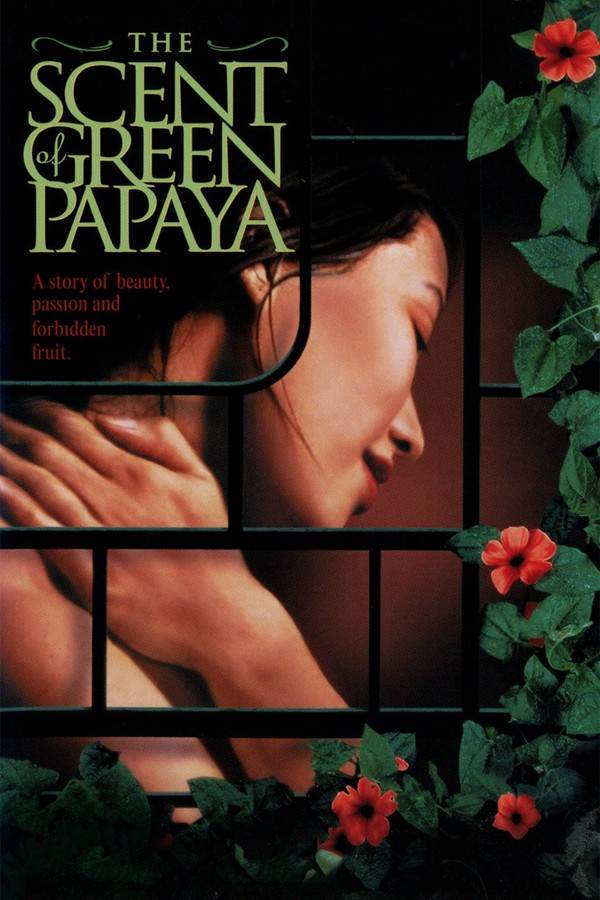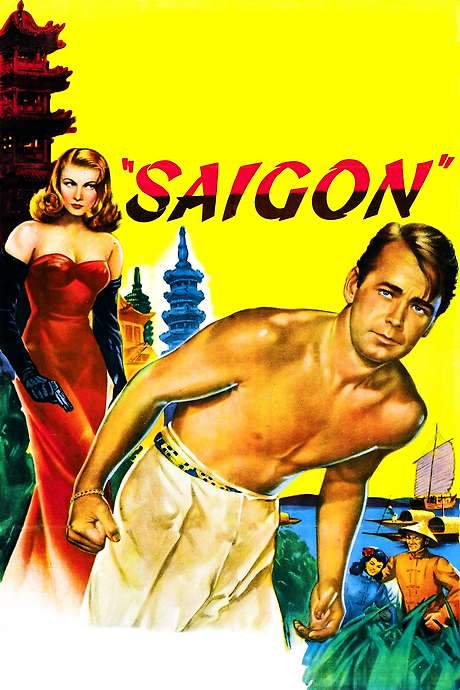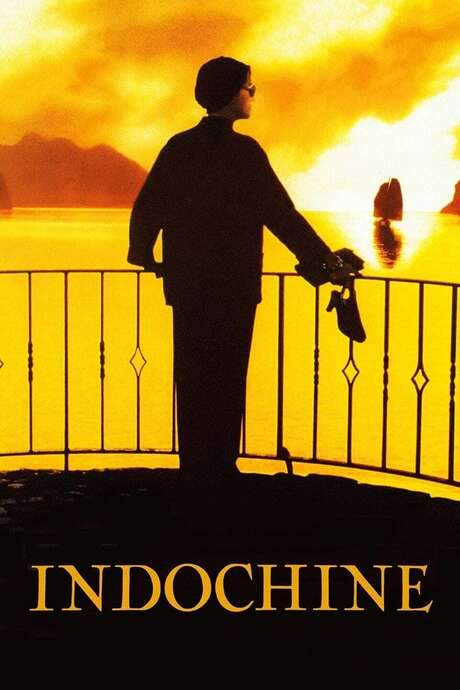The Scent of Green Papaya 1994

In 1950s Saigon, a young servant girl named Mui finds comfort in music while working for a wealthy family experiencing financial hardship. She develops feelings for Khuyen, a local pianist, and their connection deepens as they navigate changing fortunes and societal expectations. The story explores themes of loyalty, passion, and the challenges of personal identity against a backdrop of a changing Vietnam.
Does The Scent of Green Papaya have end credit scenes?
No!
The Scent of Green Papaya does not have end credit scenes. You can leave when the credits roll.
Meet the Full Cast and Actors of The Scent of Green Papaya
Explore the complete cast of The Scent of Green Papaya, including both lead and supporting actors. Learn who plays each character, discover their past roles and achievements, and find out what makes this ensemble cast stand out in the world of film and television.
External Links and Streaming Options
Discover where to watch The Scent of Green Papaya online, including streaming platforms, rental options, and official sources. Compare reviews, ratings, and in-depth movie information across sites like IMDb, TMDb, Wikipedia or Rotten Tomatoes.
Ratings and Reviews for The Scent of Green Papaya
See how The Scent of Green Papaya is rated across major platforms like IMDb, Metacritic, and TMDb. Compare audience scores and critic reviews to understand where The Scent of Green Papaya stands among top-rated movies in its genre.

81
Metascore
tbd
User Score


%
TOMATOMETER

0%
User Score

7.3 /10
IMDb Rating

71
%
User Score
Take the Ultimate The Scent of Green Papaya Movie Quiz
Challenge your knowledge of The Scent of Green Papaya with this fun and interactive movie quiz. Test yourself on key plot points, iconic characters, hidden details, and memorable moments to see how well you really know the film.
The Scent of Green Papaya Quiz: Test your knowledge about 'The Scent of Green Papaya' and its rich narrative of decline and resilience.
What prompts the decline of the family's fortunes?
The wife's poor financial decisions
The husband's four ill-fated dalliances and reckless spending
Mùi's arrival in the household
The loss of the family's ancestral home
Show hint
Awards & Nominations for The Scent of Green Papaya
Discover all the awards and nominations received by The Scent of Green Papaya, from Oscars to film festival honors. Learn how The Scent of Green Papaya and its cast and crew have been recognized by critics and the industry alike.
66th Academy Awards 1994
Foreign Language Film
Full Plot Summary and Ending Explained for The Scent of Green Papaya
Read the complete plot summary of The Scent of Green Papaya, including all major events, twists, and the full ending explained in detail. Explore key characters, themes, hidden meanings, and everything you need to understand the story from beginning to end.
A young girl named Mùi finds herself in the role of a servant for a family in pre-unification Saigon (1951), which, despite its former wealth, is now slipping into genteel poverty, largely due to the husband’s reckless spending and unfaithfulness. The family’s financial stability hinges on the wife’s modest fabric and textile shop. The husband’s widowed mother, an invalid who rarely leaves her upstairs room, constantly blames her daughter-in-law, insisting, > “You have a man, but you don’t know how to keep him happy.” The family dynamics are strained: the eldest son prefers the company of friends, the bookish middle son finds amusement in tormenting insects, and the youngest son idolizes his father while displaying willful and disruptive behavior, often filled with resentment. In contrast, Mùi is a figure of peace and deep curiosity about the world around her. The wife, who once lost a young daughter during one of her husband’s frequent absences, shows kindness to Mùi, treating her as if she were her own child.
When the husband embarks on his fourth and ultimately final disappearance, he absconds with his wife’s scant savings and jewelry. His absence stretches long enough that the family faces severe hunger and deprivation. Upon his return, he brings back some of the stolen jewelry, but soon collapses after arriving home. In a desperate bid to prepare for his medical needs, the wife sells an heirloom vase and other cherished items, prompting a doctor to be called. While Mùi witnesses the doctor treating her husband with acupuncture, friendly musicians play cheerful tunes outside the room. Yet, when he passes away, the wife faints, leaving the family in shock and despair.
Fast forward ten years, the family has continued to deteriorate; two of the sons have left, and the wife has taken on the role of the grandmother, now tragic and rarely seen. On the family shrine, the photographs of the grandmother and the husband now share space with others who have departed. It’s deemed that the family can no longer afford Mùi’s services. With a heavy heart, the wife gifts Mùi a silk dress and some gold jewelry before she moves on to work for the wealthy friend of her eldest son, who has become a concert pianist engaged to be married. However, he appears to be more enamored with his piano than with his lavish fiancée.
One fateful night, while the fiancée babbles on, the pianist’s playing takes on a stormy intensity as he tries to ignore her. After she leaves, intending to spy through the window, she witnesses something extraordinary: when Mùi enters the room, the pianist’s music transforms into a blend of passion and tranquility. Later that night, he discreetly visits Mùi in her quarters and shuts the door behind him. When the fiancée discovers this, filled with rage, she slaps Mùi, damages some of the pianist’s belongings, and leaves her engagement ring on a table. Upon returning, he nonchalantly picks up the ring, and their secret connection grows deeper as he begins teaching Mùi how to read and write. In the poignant final scene, a visibly pregnant Mùi is seen reading poetry to him, her face adorned with a radiant smile.
Uncover the Details: Timeline, Characters, Themes, and Beyond!

Coming soon on iOS and Android
The Plot Explained Mobile App
From blockbusters to hidden gems — dive into movie stories anytime, anywhere. Save your favorites, discover plots faster, and never miss a twist again.
Sign up to be the first to know when we launch. Your email stays private — always.
Watch Trailers, Clips & Behind-the-Scenes for The Scent of Green Papaya
Watch official trailers, exclusive clips, cast interviews, and behind-the-scenes footage from The Scent of Green Papaya. Dive deeper into the making of the film, its standout moments, and key production insights.
The Scent of Green Papaya Themes and Keywords
Discover the central themes, ideas, and keywords that define the movie’s story, tone, and message. Analyze the film’s deeper meanings, genre influences, and recurring concepts.
The Scent of Green Papaya Other Names and Titles
Explore the various alternative titles, translations, and other names used for The Scent of Green Papaya across different regions and languages. Understand how the film is marketed and recognized worldwide.
Similar Movies To The Scent of Green Papaya You Should Know About
Browse a curated list of movies similar in genre, tone, characters, or story structure. Discover new titles like the one you're watching, perfect for fans of related plots, vibes, or cinematic styles.
Quick Links: Summary, Cast, Ratings, More

What's After the Movie?
Not sure whether to stay after the credits? Find out!
Explore Our Movie Platform
New Movie Releases (2026)
Famous Movie Actors
Top Film Production Studios
Movie Plot Summaries & Endings
Major Movie Awards & Winners
Best Concert Films & Music Documentaries
Movie Collections and Curated Lists
© 2026 What's After the Movie. All rights reserved.































